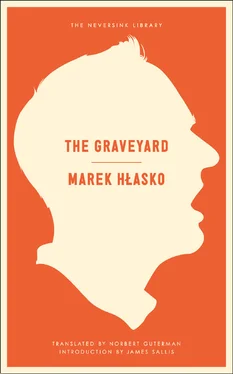“Come now,” the secretary said, “what are you trying to say?”
Jarzebowski cracked his knuckles — his nervous hands seemed to have a life of their own. “The fact is,” he said dejectedly, “the fact is, I have nothing good to report. Please try to understand, this is not an easy thing for me to say; it’s terribly unpleasant — please, understand me, dear sir, my situation is very, very delicate — but the duty of a Pole, a Left Winger …”
“Speak up; don’t be afraid.”
“A parcel,” Jarzebowski blurted out.
“What parcel?”
“Malinowska, in the Bookkeeping Department. I mean, my department,” Jarzebowski added modestly, once again accompanying his words with a magnificent toss of his mane.
“Well, go on, what’s next?”
“You’ve been good enough, if I may say so, to hit the nail on the head. That’s just it: what next?”
“I don’t understand.”
Jarzebowski pounded his chest. “It’s my fault, dear sir, my fault. Apparently I haven’t been able to express myself clearly enough. Malinowska, of the Bookkeeping Department, received a parcel.”
“Where from?”
Jarzebowski stood on his toes, raising his hands, as though addressing legions of witnesses. “That’s the whole point,” he said in a metallic voice. “A parcel from the West.”
“From — the — We-e-est?”
“From the West. What’s more, she makes no secret of it. She told me herself. She even treated me to a cigarette, which I have taken the liberty of bringing here …” He reached into the upper pocket of his waistcoat, drew out a cigarette, and set it down in front of the secretary. “Please — here it is.”
They stared at each other for a moment with piercing eyes. The secretary let out a whistle. “So that’s how it is.”
“Yes, indeed.”
They remained silent. The clock on the wall ticked maddeningly. Somewhere in the factory a powerful engine was being tested at full speed; it stopped, only to start up again with an ear-splitting roar.
“A parcel,” the secretary said pensively. Carefully, with the tips of his fingers, he picked up the cigarette and examined it from all sides; he turned it this way and that, sniffed it, and at last put it down, shaking his head. “A cigarette,” he said; “the devil knows what that can lead to. That’s how it always begins: parcels, cigarettes, nylons, a few trinkets, and then it turns out …”
He paused, and his face tensed as if he were about to give birth to some powerful new idea, unique in form and expression. Jarzebowski held his breath; and to Franciszek, who was watching from the side, the secretary seemed to have become petrified. The suspense was palpable; even the clock seemed to be ticking more slowly.
“Thank you, Jarzebowski,” the secretary said hoarsely after a while. “Our organization will take the matter up.” He rose from his seat. “Thanks,” he repeated. He shook the bookkeeper’s hand vigorously, and as the latter turned his noble mane in the direction of the door, the secretary repeated once again, “Thank you, Citizen.”
“Not at all,” Jarzebowski said, and, turning to Franciszek, “How about our club?”
Franciszek clenched his jaw. “We’ll see about that later,” he said.
“Thanks,” the secretary cried. He moved his chair over to Franciszek, patting him on the knee. “What do you think about it?”
He shrugged. “I don’t know. Lots of people get parcels from abroad.”
The secretary smiled jeeringly. “Parcels,” he repeated. He leaned toward Franciszek, and lowered his voice to a whisper. “You don’t know them.”
“Whom do you mean?”
“Them.”
“But, damn it, the contents of the parcels are checked, aren’t they?”
“You don’t know them, and that’s all there is to it,” he said, keeping his superior smile. “Well, what’s new with you? You were saying that you couldn’t manage the campaign, weren’t you?”
“It has nothing to do with the campaign,” Franciszek said in a rage. “Yesterday I was detained in a police station, do you understand?”
“You? In a police station?”
“Yes.”
“But why?”
Franciszek jumped to his feet. “Listen, Jan,” he said, putting his hand on the other’s arm. “You know me. Surely I don’t have to tell you who I am and what I think, and why I am in the party. But yesterday I got horribly drunk …” He walked a few steps, then turned his face toward the other. “Yesterday I insulted the party,” he said in a wooden voice.
“You?”
“Me.”
“But— But—” the secretary stammered. “What did you say?”
“I told them that they could stick it all up …” Franciszek said, staring at the wall. “And I said something much worse, but even they, in the station, were ashamed to repeat it. And I myself don’t remember. I was in a blur for a minute, so furious I was out of my head, and everything I said left my mind; nothing remains — a blank.”
“Man, man,” the secretary was stammering. “What have you done? What police station was that?”
“Forty-two.”
“Ah,” the secretary said with sudden relief. “Well, my friend, you’re lucky. I’ll ring them up at once; I have a friend there, a colleague — we may be able to fix it.”
He picked up the receiver; Franciszek restrained his hand. “No,” he said, “that’s not what I want, Jan.”
“Well?”
“I don’t want to settle the matter that way, Jan. They took everything down in black and white — that I’m an enemy.” He shook his head. “This must be handled differently. At the moment I can’t trust myself. The party must look into this.”
“The party?”
“Yes. It’s up to our comrades to say that I’m right. They’ve got to tell me that they trust me, the way they have always trusted me up till now. And that my position here is justified. There’s a meeting tomorrow. I want you to put the case on the agenda. Listen — I’ve got a son, a grown son, who’s in the party. I have a daughter who will also join the party someday. My children must believe in me. I don’t want anyone to tell them, ‘Your father’s the kind of fellow who says one thing, and thinks another …’ I don’t think that way. I never thought that way — or else I wouldn’t be here, with you, now. Unity of thought and word and deed, that’s what makes a man. To my mind that’s the meaning of loyalty … Do you understand me, Jan?”
“I understand, of course; I understand,” the other said. He was staring at the window; a wretched gray light seeped through the pane, trying to assert itself against the crazily flickering bulb on the ceiling. The secretary pressed his head with his hands. “What a filthy day it is!” he said. “First you, then Baniewicz with Majewska, then this parcel … You look at it superficially — the parcel is fine. It’s labeled, sealed, passed — that’s the end of it, you might think. But hell knows what it may lead to …” He looked heavily at Franciszek. “Damn it all!” he said in a fury. “Haven’t I enough troubles? Just tell me. First it’s Baniewicz, then it’s a parcel, now it’s some other dirty business — to hell with it all …” He drummed on the table with his fingers; the terrible roar of the engines in the workshops went on and off. “Why did you have to blurt it out?” the secretary asked.
Franciszek froze suddenly, as though coated with ice. “What did you say?” he growled.
“Why did you have to talk?” the secretary went on, staring at the dusty windowpanes. “Listen to me: Are you a party comrade? You are. Have you a card? You have. Have you a job? You have. Well, damn it, behave like a party comrade. But instead you suddenly scream at the top of your lungs, ‘I believe, I don’t believe, stick it all up …’ Goddam it, who asked you to go into all that?”
Читать дальше






![Ричард Деминг - Whistle Past the Graveyard [= Give the Girl a Gun]](/books/412176/richard-deming-whistle-past-the-graveyard-give-t-thumb.webp)


